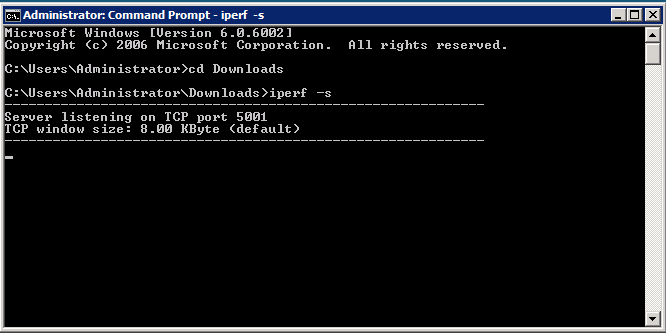You can download Iperf.exe from:
Iperf.exe Linhost.info or Iperf.exe Ucf.edu
We will be making use of the command line, do not fear the command line Iperf is a simple tool to use.
Say I want to test the available bandwidth between a server(Windows Server 2008) and a client workstation(Windows 7). Iperf will try to move as much data as possible using the available link in order to conduct the test.

Instructions
Download the Iperf executable and place the file on any directory you wish, my web browser(Firefox) places all downloaded files on the Download directory which is where I will be executing Iperf from.
Note:You will need to open port 5001 on the Iperf server.
Server Setup
Go to Start > All Programs > Accessories > Command Prompt

With the command line prompt open type
cd Dowloads
or the location where the Iperf executable resides.
Now that you are in the same directory as Iperf type
iperf -s
to start the Iperf server. If you look at the screen Iperf listens on port 5001 you may have to open port 5001 on your firewall.

Client Set Up
Imitating the steps above execute Iperf in the same manner, but this time we are going to give the Iperf client different instructions. On the Iperf client command line type
iperf -c 192.168.1.51
. This will be our client and we are telling Iperf the server is located at 192.168.1.51.
Give Iperf some time to test the connection, after the test is done Iperf will present the results.
The results are easy to understand in this case Iperf managed to transfer 113 Mbytes at 94.5 Mbits/s, the results will changed when used on a busy network which is where Iperf will reveal the amount of available bandwidth in the network.
There are also many switches you can use to tune your testing for instance for testing IP phone traffic which is all udp you can use the -u switch here is an exmaple command with a more refined iperf session
C:\iperf>iperf -c 10.1.144.10 -u 3.5m -t 60 -i 10 -r -b
-u = udp
3.5m = 3.5 megs of traffic
-t 60 = 1 minute 60 seconds
-i = interval
-b = bidirectional
-r = tradaoff bidirectional test individually